
Emergency medical services (EMS), also known as ambulance services or paramedic services, are emergency services that provide urgent pre-hospital treatment and stabilisation for serious illness and injuries and transport to definitive care. They may also be known as a first aid squad, FAST squad, emergency squad, ambulance squad, ambulance corps, life squad or by other initialisms such as EMAS or EMARS.
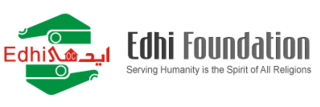
The Edhi Foundation is a non-profit social welfare organization based in Pakistan. It was founded by Abdul Sattar Edhi in 1951, who served as the head of the organization until his death on 8 July 2016. Bilquis Edhi, a nurse by profession, used to oversee the maternity and adoption services of the foundation. The Edhi Foundation is headquartered in the city of Karachi.

A paramedic is a healthcare professional, providing pre-hospital assessment and medical care to people with acute illnesses or injuries. In Canada, the title paramedic generally refers to those who work on land ambulances or air ambulances providing paramedic services. Paramedics are increasingly being utilized in hospitals, emergency rooms, clinics and community health care services by providing care in collaboration with registered nurses, registered/licensed practical nurses and registered respiratory therapists.
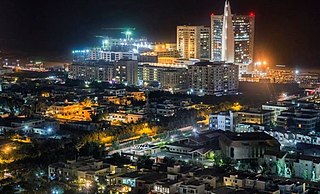
Karachi is the financial and industrial capital of Pakistan. As of 2019, Karachi has an estimated GDP (PPP) of $164 billion. The city accounts about half of the total collections of the Federal Board of Revenue, out of which, approximately half are customs duty and sales tax on imports. Karachi produces about 30 percent of value added in large-scale manufacturing, 25% of the GDP, the World Bank identified Karachi as the most business-friendly city in Pakistan. In 2010, research by the global human resources company Mercer found Karachi to be the most inexpensive city in the world.
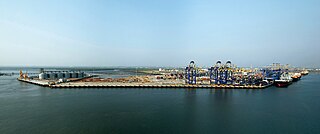
The Port Muhammad Bin Qasim, or Qasim Port Authority, also known as Port Qasim, is a deep-water seaport in Karachi, Sindh, Pakistan, on the coastline of the Arabian Sea under the administrative control of the Secretary to the Government of Pakistan for Maritime Affairs. It is Pakistan's second busiest port, handling about 35% of the nation's cargo. Port Qasim and Karachi Port, the busiest port of country, together handle more than 90% of all external trade of Pakistan.

A traditional birth attendant (TBA), also known as a traditional midwife, community midwife or lay midwife, is a pregnancy and childbirth care provider. Traditional birth attendants provide the majority of primary maternity care in many developing countries, and may function within specific communities in developed countries.
The Liaquat National Hospital is located at Stadium Road, Karachi, Sindh, Pakistan.

The healthcare delivery system of Pakistan is complex because it includes healthcare subsystems by federal governments and provincial governments competing with formal and informal private sector healthcare systems. Healthcare is delivered mainly through vertically managed disease-specific mechanisms. The different institutions that are responsible for this include: provincial and district health departments, parastatal organizations, social security institutions, non-governmental organizations (NGOs) and private sector. The country's health sector is also marked by urban-rural disparities in healthcare delivery and an imbalance in the health workforce, with insufficient health managers, nurses, paramedics and skilled birth attendants in the peripheral areas. Pakistan's gross national income per capita in 2021 was $4,990 and the total expenditure on health per capita in 2021 was Rs 657.2 Billion, constituting 1.4% of the country's GDP. The health care delivery system in Pakistan consists of public and private sectors. Under the constitution, health is primarily responsibility of the provincial government, except in the federally administrated areas. Health care delivery has traditionally been jointly administered by the federal and provincial governments with districts mainly responsible for implementation. Service delivery is being organized through preventive, promotive, curative and rehabilitative services. The curative and rehabilitative services are being provided mainly at the secondary and tertiary care facilities. Preventive and promotive services, on the other hand, are mainly provided through various national programs; and community health workers’ interfacing with the communities through primary healthcare facilities and outreach activities. The state provides healthcare through a three-tiered healthcare delivery system and a range of public health interventions. Some government/ semi government organizations like the armed forces, Sui Gas, WAPDA, Railways, Fauji Foundation, Employees Social Security Institution and NUST provide health service to their employees and their dependents through their own system, however, these collectively cover about 10% of the population. The private health sector constitutes a diverse group of doctors, nurses, pharmacists, traditional healers, drug vendors, as well as laboratory technicians, shopkeepers and unqualified practitioners.
Nursing is a major component of Pakistan's health-care system. The topic has been the subject of extensive historical studies, is as of 2009 a major issue in the country, and has been the subject of much scholarly discussion amongst academics and practitioners. In 2009, Pakistan’s government stated its intent to improve the country's nursing care.

New Orleans Emergency Medical Services is the primary provider of advanced life support emergency medical services to the city of New Orleans, Louisiana, United States. Unlike most other emergency medical services in the United States, New Orleans EMS operates as a third service and is not part of the New Orleans Fire Department; rather, New Orleans EMS is operated by the New Orleans Health Department and the New Orleans Office of Homeland Security and Emergency Preparedness.
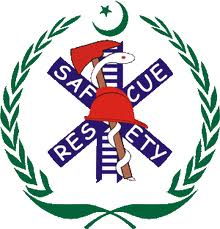
Rescue 1122 is an emergency service that serves Punjab Province, KPK Province, Balochistan Province, Sindh Province, Gilgitbaltistan and Azad Kashmir in Pakistan. The service is accessed by calling 1122 from any phone in Pakistan.
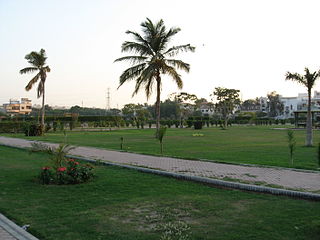
Karachi East District is an administrative district of Karachi Division in Sindh, Pakistan.

Chhipa Welfare Association, commonly known as Chhipa, is a Pakistani non-profit welfare organization founded in 2007 by Ramzan Chhipa. It is headquartered in Karachi, Pakistan.

Ghulam Muhammad Mahar Medical College or GMMMC in short is the sixth public sector Medical college under the Government of Sindh where 100 students of Sukkur, Khairpur and Ghotki are getting education every year. It is named after Sindh politician Ghulam Muhammad Khan Mahar.
Emergency medicine reform in Ukraine has been part of Ukraine's healthcare reform program since its launch in 2016. Managed by the Ministry of Healthcare of Ukraine, the program is meant to improve the quality and speed of Ukraine's emergency medical care.
National Institute of Cardiovascular Diseases (NICVD); (Urdu: نيشنل انسٹيٹيوٹ آف كارڈيو ويسكيولر ڈيزيزز) in collaboration with the Government of Sindh are a chain of health care centers located in Sindh, Pakistan.
Emergency medical services (EMS) in Pakistan are provided both by the government and private sector, with the latter being main a payment-for-service system. Healthcare falls under the responsibility of provincial governments, except for in the federally administered territories.
Akhuwat Foundation is a nonprofit organization based in the country of Pakistan that provides interest-free loans to individuals who are unable to access formal financial services. It was founded in 2003 by Dr. Muhammad Amjad Saqib who is the executive director of the organization. Akhuwat's head office is located in Lahore and it has over 3 branches across 1,500 cities in Pakistan.

Squatting in Pakistan is the occupation of unused land or derelict buildings without the permission of the owner. Squatted informal settlements formed following the creation of Pakistan in 1947. They were known first as "bastis" then later "katchi abadis" and the inhabitants were forcibly resettled under military rule. By 2007, there were 7.5 million squatters in Karachi alone. The Sindh Katchi Abadi Authority (SKAA) announced in 2019 that a total of 1,414 katchi abadis had been located and 1,006 of those had been contacted with regards to beginning a regularization process.
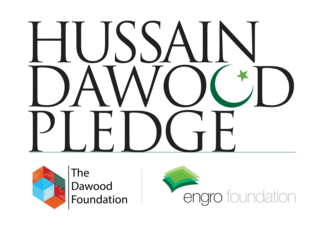
The Hussain Dawood Pledge (HD-Pledge) is one of the biggest private donations and initiatives to fight against the COVID-19 pandemic in Pakistan. Hussain Dawood, on behalf of Engro, Dawood Hercules and his family pledged on 2 April 2020 a contribution in services, kind, and cash of Pakistani rupee (PKR) 1 billion . The contribution became public a day after Prime Minister Imran Khan announced the coronavirus relief fund to fight the pandemic and urged everyone to donate.














